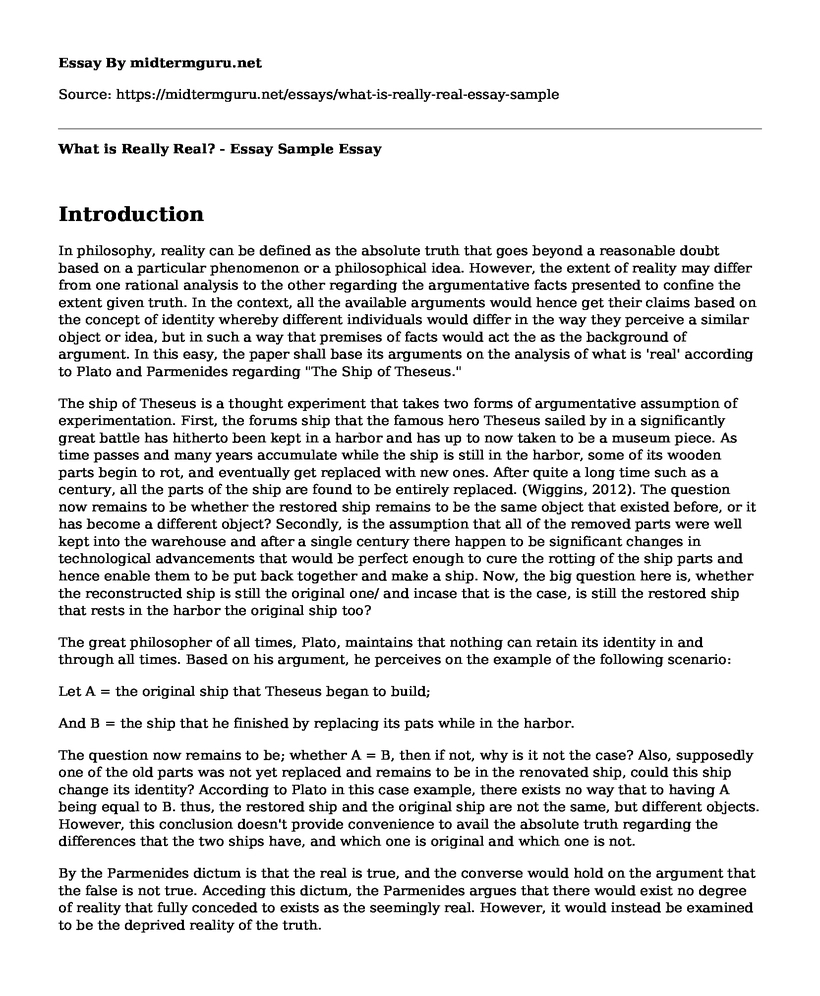Introduction
In philosophy, reality can be defined as the absolute truth that goes beyond a reasonable doubt based on a particular phenomenon or a philosophical idea. However, the extent of reality may differ from one rational analysis to the other regarding the argumentative facts presented to confine the extent given truth. In the context, all the available arguments would hence get their claims based on the concept of identity whereby different individuals would differ in the way they perceive a similar object or idea, but in such a way that premises of facts would act the as the background of argument. In this easy, the paper shall base its arguments on the analysis of what is 'real' according to Plato and Parmenides regarding "The Ship of Theseus."
The ship of Theseus is a thought experiment that takes two forms of argumentative assumption of experimentation. First, the forums ship that the famous hero Theseus sailed by in a significantly great battle has hitherto been kept in a harbor and has up to now taken to be a museum piece. As time passes and many years accumulate while the ship is still in the harbor, some of its wooden parts begin to rot, and eventually get replaced with new ones. After quite a long time such as a century, all the parts of the ship are found to be entirely replaced. (Wiggins, 2012). The question now remains to be whether the restored ship remains to be the same object that existed before, or it has become a different object? Secondly, is the assumption that all of the removed parts were well kept into the warehouse and after a single century there happen to be significant changes in technological advancements that would be perfect enough to cure the rotting of the ship parts and hence enable them to be put back together and make a ship. Now, the big question here is, whether the reconstructed ship is still the original one/ and incase that is the case, is still the restored ship that rests in the harbor the original ship too?
The great philosopher of all times, Plato, maintains that nothing can retain its identity in and through all times. Based on his argument, he perceives on the example of the following scenario:
Let A = the original ship that Theseus began to build;
And B = the ship that he finished by replacing its pats while in the harbor.
The question now remains to be; whether A = B, then if not, why is it not the case? Also, supposedly one of the old parts was not yet replaced and remains to be in the renovated ship, could this ship change its identity? According to Plato in this case example, there exists no way that to having A being equal to B. thus, the restored ship and the original ship are not the same, but different objects. However, this conclusion doesn't provide convenience to avail the absolute truth regarding the differences that the two ships have, and which one is original and which one is not.
By the Parmenides dictum is that the real is true, and the converse would hold on the argument that the false is not true. Acceding this dictum, the Parmenides argues that there would exist no degree of reality that fully conceded to exists as the seemingly real. However, it would instead be examined to be the deprived reality of the truth.
Therefore, the Theseus ship, in this case, can say be lacking the right positioning of reality based on which is the original and which one is not. Both Plato and Parmenides dictums fail to define the real truth of the state of existence of the Theseus ship. Thus, there may not exist the real reality of a given phenomenon.
Work Cited
Wiggins, David. "Identity, individuation and substance." European Journal of Philosophy vol.20, no.1, 2012, pp. 1-25. https://doi.org/10.1111/j.1468-0378.2012.00516.x
Cite this page
What is Really Real? - Essay Sample. (2023, Jan 15). Retrieved from https://midtermguru.com/essays/what-is-really-real-essay-sample
If you are the original author of this essay and no longer wish to have it published on the midtermguru.com website, please click below to request its removal:
- Kants Political Writings Essay: Categorical Imperative
- How Two Different Theorists Marx and Weber Would Explain the Same Article
- Socrates on Moral Decisions Essay Example
- Ethical Principles for Improving Management & Service Delivery in Healthcare - Essay Sample
- Ethics in Communication: Ensuring Authentic Communication for Businesses - Essay Sample
- My Opinion About Chris McCandless and Transcendentalism
- Explaining Meta-Ethical Theories for a Better Understanding - Essay Sample







